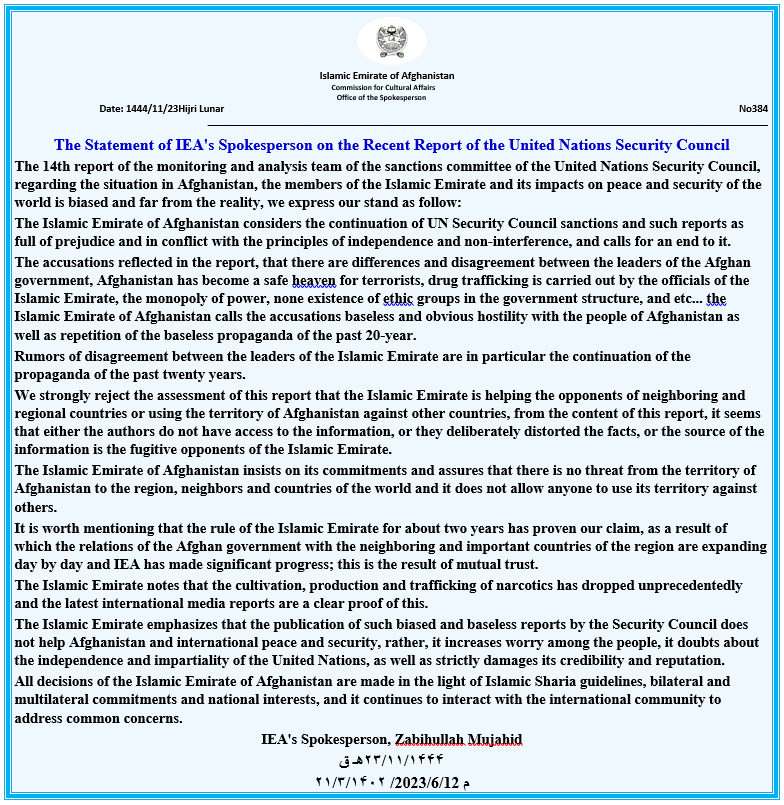
The Islamic Emirate of Afghanistan (IEA) decries a UN report “biased and far from reality”
“A range of terrorist groups have greater freedom of manoeuvre under the Taliban de facto authorities. They are making good use of this, and the threat of terrorism is rising in both Afghanistan and the region.”
The United Nations Sanctions Monitoring Team for the Taliban released a report in June 2023 critically assessing the status of the Taliban’s rule of Afghanistan since the group took over the country in August 2021. For its part, the Taliban released an equally scathing rebuke of the UN’s report. The Monitoring Team report, which draws from reporting by UN member states, underscores the link between the Taliban’s rule and the greater latitude of movement that certain terror groups have in the region. Most notably, it articulates that “the link between the Taliban and both Al-Qaida and Tehrik-e-Taliban Pakistan (TTP) remains strong and symbiotic,” and that there “are indications that Al-Qaida is rebuilding operational capability [and] that the TTP is launching attacks into Pakistan with support from the Taliban.” The report does note that not all terrorist groups enjoy equal latitude: the Taliban has attacked members of the Islamic State in Khorasan (IS-K), though not to a degree that the operations of the latter have declined in a meaningful way. To the contrary, the report suggests that IS-K’s numbers have grown substantially, now estimated to be between 4,000 and 6,000 fighters, a number that members of the U.S. intelligence community have claimed is significantly higher than their estimates.[i] IS-K has taken advantage of the lack of Taliban control to consolidate its power in more remote locations. As the UN report notes, “Attacks against high-profile Taliban figures raised [IS-K] morale, prevented defections, and boosted recruitment, including from within the Taliban’s ranks.”
Representatives of the Taliban government responded, calling the UN’s report “biased and far from reality” and “full of prejudice.” The Taliban press release notes that contrary to what the UN report claims, the Taliban government does not allow its territory to be used to threaten neighboring countries, the region, or the world writ large. From the perspective of the Taliban, “the publication of such reports…does not help Afghanistan…rather, it increases worry among the people… [and casts] doubts on [sic] the impartiality and independence of the United Nations.” The Taliban’s takeover of Afghanistan has widened the window of growth for Al-Qaeda, the Islamic State, and other terrorist groups. The same threat actors that have consumed it for nearly two decades—the Taliban, Al-Qaeda, and the Islamic State—still remain pernicious challenges even as the United States has shifted to focus most acutely on near-peer competition with China and Russia. [ii]
Sources:
“Letter dated 23 May 2023 from the Chair of the Security Council Committee established pursuant to resolution 1988 (2011) addressed to the President of the Security Council,” 1 June 2023, United Nations Security Council Taliban Sanctions Monitoring Team. https://www.un.org/securitycouncil/sanctions/1988/monitoring-team/reports
The Taliban, in power as the de facto authorities in Afghanistan under Hibatullah Akhundzada, have reverted to the exclusionary, Pashtun-centred, autocratic policies of the Taliban administration of the late 1990s.
The link between the Taliban and both Al-Qaida and Tehrik-e-Taliban Pakistan (TTP) remains strong and symbiotic. A range of terrorist groups have greater freedom of manoeuvre under the Taliban de facto authorities. They are making good use of this, and the threat of terrorism is rising in both Afghanistan and the region. While they have sought to reduce the profile of these groups and have conducted operations against Islamic State of Iraq and the Levant – Khorasan Province (ISIL-K), in general, the Taliban have not delivered on the counter-terrorism provisions under the Agreement for Bringing Peace to Afghanistan between the United States of America and the Taliban.
There are indications that Al-Qaida is rebuilding operational capability, that TTP is launching attacks into Pakistan with support from the Taliban, that groups of foreign terrorist fighters are projecting threat across Afghanistan’s borders and that the operations of ISIL-K are becoming more sophisticated and lethal (if not more numerous).
It is too early to judge the impact of the decree by the Taliban in April 2022 banning poppy cultivation. At this point, prices have increased, as has production of the more profitable methamphetamine. Key Taliban individuals remain closely involved in production and trafficking. The Taliban de facto authorities have had some success in revenue generation and budgetary management, with the caveat that data on expenditures is scant and opaque. The effectiveness of the sanctions regime appears mixed. There is little evidence that it substantially impacts Hibatullah’s decision-making, but lifting sanctions measures is a constant demand by the Taliban engaging Member States. Widespread availability and proliferation of weapons and materiel already in Afghanistan undermines the arms embargo. A number of travel ban exemptions have been sought since the end of the group exemption for the Taliban in August 2022, but information regarding unauthorized travel and late requests is concerning.
Notes:
[i] Jeff Seldin, “UN Report Warns Al-Qaida, Islamic State Growing in Afghanistan,” Voice of America, 15 June 2023. https://www-voanews-com.cdn.ampproject.org/c/s/www.voanews.com/amp/un-report-warns-al-qaida-islamic-state-growing-in-afghanistan/7138133.html
[ii] For more on the state of the global terrorist landscape, see: Jason Warner, “Global Terrorism Declined Slightly in 2022, With the Sahel as the New Epicenter,” OE Watch, 5-2023. https://fmso.tradoc.army.mil/2023/global-terrorism-declined-slightly-in-2022-with-the-sahel-as-the-new-epicenter/; Jason Warner, “African Leaders, UN See Terrorism in the Sahel as Dire,” OE Watch, 11-2022. https://community.apan.org/wg/tradoc-g2/fmso/m/oe-watch-articles-2-singular-format/429303; Jason Warner, “Global Reactions Vary After Death of Al-Qaeda Leader Al-Zawahiri,” OE Watch, 9-2022. https://community.apan.org/wg/tradoc-g2/fmso/m/oe-watch-articles-2-singular-format/425695
Image Information:
Image: The Islamic Emirate of Afghanistan (IEA) decries a UN report “biased and far from reality”
Source: https://www.alemarahenglish.af/the-statement-of-ieas-spokesperson-on-the-recent-report-of-the-united-nations-security-council/
Attribution: Public Domain
